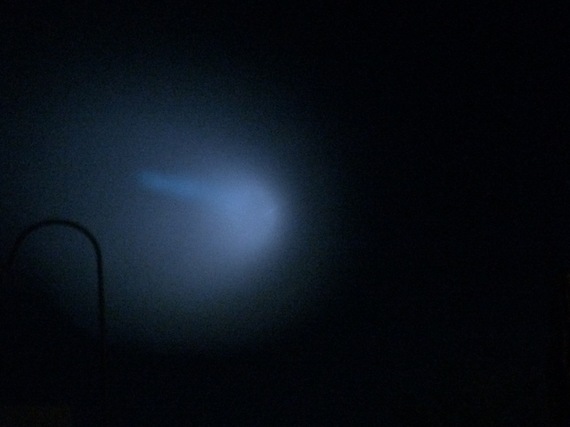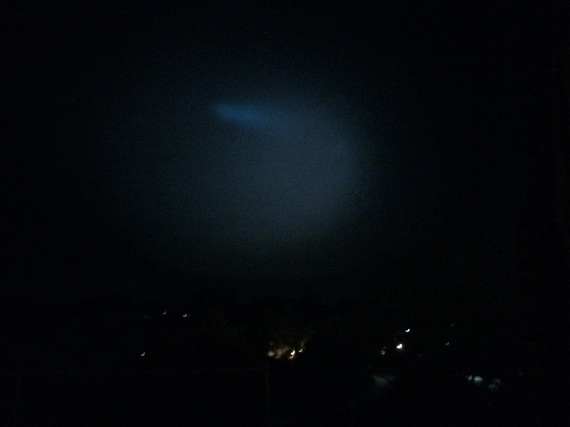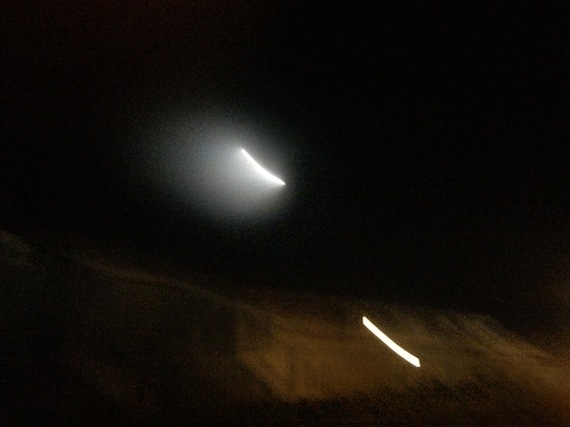Photo credit: Rachel, age 9, with permission
It was a cool, San Diego autumn evening on Saturday, Nov. 7, 2015. The sun had just set as I chatted on the phone with my cousin while making dinner. The kids, age 9 and 6, burst through the patio door with four neighborhood friends, all hollering at once.
"MOM! You GOTTA come see this!" my daughter yelled above the din.
I hustled out onto our townhouse patio with them and saw in the sky something I've never seen in 42 years on this planet. There was a streak of blinding white, which quickly turned to bright blue, a smaller streak below it. Around the main streak, a nebulous-looking, sea-blue cloud began to grow, at one point taking up the entire sky above the trees of our local canyon. No sound, but a huge sight -- otherworldly, mysterious, beautiful.
Two more moms, and a couple more kids, showed up then, everyone yelling and chattering about what was happening in the sky. "Mom! Gimme your camera!" a quick 9-year-old neighbor said to her mother, in her adorably squeaky voice. She nabbed photos. Then the moms and older kids began to Google. "What just exploded in the sky?" we asked the online oracle. We tried other searches -- military, observatories -- and finally came across photos of meteors, which looked remarkably like what we were witnessing.
"It's a meteor! It's a meteor!" the kids cried out, forming the group hypothesis. Questions and statements about whether it would Earth, is that what killed the dinosaurs, how far away or rare it was, rang out from our little crowd of children. The energy was of awe and wonder, tinged with a bit of fear of the unknown. It was electric. None of us had ever seen anything like it.
After the blue cloud and the excitement faded, we all hugged, marveled at the shared experience, and went back to our houses. Still puffed up with adrenaline, I posted the neighbor child's photos on Facebook, joining the online conversation with other Californians and newswatchers about what had just happened in the sky.
For a while, nobody knew what it was; there was just description and speculation. NBC San Diego reported one witness saying:
"I'm like: It's not a firework, it's not a falling star, it's not the moon... I don't know what it was... but it was the coolest thing I've ever seen in my life."
It really was. I felt exhilarated, like we'd witnessed a once-in-lifetime event. I knew in the back of my mind it might be military operations. But, honestly, I wanted it to be a meteor, or something similarly natural, so I let myself hold that hypothesis.
Next morning, news reports ran statements from the U.S. Navy and the Coast Guard that what we saw was in fact weapons testing off the Southern California Coast. Friends messaged and called to tell me our sighting wasn't a meteor, but a missile.
I admit, at first I was embarrassed by my own awe and wonder, my own enthusiasm and Facebook posting of the event in the sky. I got swept up in the kids' excitement, I thought. I didn't do my journalistic due diligence before I posted, I scolded myself. Both true. And yet.
Yet, as I thought about this experience the rest of the night and the next morning, I tried to tap into what was really behind the sick feeling in my gut. First, there was the obvious: realizing such a huge weapon was exploding in our sky, above our coastline, disturbed my sense of safety and distance from war and attack.
Of course, living in San Diego, just below Camp Pendleton, we know military exists, and we're told it exists for our protection. Reading the news, we know our country spends some $600 billion a year on defense. And yet, seeing missiles explode in our backyard sky made it that much more real, that much more here and us, not some other people, some other place, far away.
I thought of NPR interviews with people in war-torn countries, who grow numb to the bombs exploding in their city, in their neighborhood, even on their own street. I thought of how it was a perfectly normal fall day in New York on 9/11 before everything changed, as it was a regular August day in Hiroshima for the civilians there when the bomb hit.
But, beyond this practical sense of bombs in the sky evoking a fear of war and weapons close to home, I was also feeling a more existential disappointment. It was the disappointment of the event in the sky not being something magical and mystical like a meteor or a comet. It was the disappointment of my children's awe and wonder (and my own) being somehow nullified when the event we found so beautiful was a manmade missile, not a natural phenomenon in our vast, mysterious solar system.
I had reveled in experiencing that awe and wonder with my children and our neighbors, sharing the excitement at seeing together a rare meteor in our sky. Was our shared wonder no longer "real" when it turned out to be something else?
I've always loved that feeling of awe, the exciting joy of the magical (and I'm not the only one -- look at Harry Potter sales). Much as I value science and fact-checking, I also seek out mystical experiences. I seek out wonder in the everyday, and feel nourished by connection to the unknowable and the Divine.
I remember being at Disneyland during college in the early '90s, watching the nighttime Fantasmic show with an old boyfriend who was a physics geek. When the water of the Rivers of America was set ablaze by Sorcerer Mickey -- that same water I'd stared at day in and day out as a Disneyland employee in high school -- I marveled at the magic of it. "Wowwwww!" I sighed. The boyfriend began to explain to me "how they did it." I shushed him. Much as I knew there was a scientific explanation, in that moment I just wanted to feel the awe.
I'm of the understanding that we can hold beliefs in both the logic of science and the magic of the unknown at the same time; they're not mutually exclusive. We can understand how all the muscles work in the human body, but still shake our heads in wonder at the surreal beauty of a particular dancer's movements. We can understand the chemicals released when we fall in love, but we can't quantify the magic that is who we fall in love with. We can chart the Monarch butterflies' migration from Canada to Mexico, but still marvel that, as stated in a recent Smithsonian Magazine, their "ability to navigate thousands of miles to a place they've never visited is one of nature's great mysteries."
Albert Einstein apparently felt similarly, as he said:
"The most beautiful thing we can experience is the mysterious. It is the source of all true art and science. He to whom the emotion is a stranger, who can no longer pause to wonder and stand wrapped in awe, is as good as dead -- his eyes are closed."
I realized that I had wanted our little community to hold that shared experience of wonder and mystery, to feel that aliveness, together. "Our meteor" being a missile changed the story of that collective experience to something different -- something no longer mysterious and much more unsettling. It turned our excitement at a meteor to our unease at a weapon, in our own backyard, which left me feeling queasy and sad.
My husband Alex gave me a gentle hug the next day. "I'm sorry your meteor turned out to be a missile," he said, squeezing my shoulder. I nodded, somewhat sheepishly rolling my eyes. "But, I'm glad you're the kind of person who chooses to see a meteor before a missile," he said with a smile. No mystery why I love this man.


